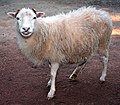Jogo do Bicho
The Jogo do Bicho ( Portuguese animal game ) is an illegal lottery game in Brazil .
origin
Around 1885 an employee of a zoo in Rio de Janeiro invented a lottery to raise urgently needed funds. He arranged 25 easy-to-remember animals in the zoo alphabetically (more or less) and assigned four consecutive numbers to each animal.
In Jogo do Bicho, the participant bets an amount on an animal whose four numbers can appear in one or more drawings of four-digit numbers (0000–9999). Sometimes there are several draws per day or bets are made on the results of official lotteries. The payout ranges from low multiples to 50,000 times the payout (for "four out of four correct numbers" in a certain drawing).
Todays situation
Today the Jogo do Bicho is particularly widespread in the poor population, as any amount can be played and the animals are easy to remember, although the payouts and bonuses are complexly calculated and combined. Against the background of widespread illiteracy in Brazil, the image is an important acceptance factor in contrast to official lotteries, where more complex lottery tickets have to be filled out. The Jogo do Bicho even gets by with verbal agreements due to the close contact between players and agents.
The contact with the game management takes place via an agent, a cambista (changer). A player has no contact with the actual game management (the bicheiro ) due to the illegality of the game. The acceptance of frequently played number combinations is controlled by the game management in order to reduce the risk of bankruptcy. Such numbers can be years or horse numbers, for example.
The Jogo do Bicho and the people and organizations associated with it are the subject of much controversy and of little reputation in Brazilian society - bicheiros and pimps are often mentioned in the same breath. While many people appreciate the possibility of a lottery for the poor, reference must be made to the illegal structures that regularly emerge around the game.
Organised crime
Since the Jogo do Bicho involves large amounts of money that are not controlled by the state, the game and its organizers have always been linked to organized crime . In big cities like Rio de Janeiro, bicheiros got rich with the game and defended their territories partly with violence, partly the game served the "established" crime as an additional source of income. In the 1970s, bicheiros often financed samba schools like Botafogo for image reasons .
The Jogo do Bicho is banned throughout Brazil today, but is de facto often tolerated (as in Rio de Janeiro), as the authorities partly earn money from the bicheiros . Carrying out and participating in the game are punishable. Tourists are strongly discouraged from participating, although they rarely come into contact with the game.
Animals and their meaning
01
Avestruz ( ostrich )
01-02-03-0402
Águia ( bald eagle )
05-06-07-0803
Burro ( house
donkey ) 09-10-11-1204
Borboleta ( butterfly )
13-14-15-1605
Cachorro ( dog )
17-18-19-2006
Cabra ( goat )
21-22-23-2407
Carneiro ( sheep / mutton)
25-26-27-2808
Camelo ( camel )
29-30-31-3210
Coelho ( hare )
37-38-39-4011
Cavalo ( horse )
41-42-43-4412
elephant ( elephant )
45-46-47-4813
Galo ( Hahn )
49 50 51 5214
Gato ( cat )
53-54-55-5615
Jacaré ( crocodile )
57-58-59-6016
Leão ( Lion )
61-62-63-6417
Macaco ( monkey )
65-66-67-6818
Porco ( pig )
69-70-71-7219
Pavão ( peacock )
73-74-75-7620
Peru ( turkey )
77-78-79-8021
Touro ( bull )
81-82-83-8422
Tigre ( Tiger )
85-86-87-8823
Urso ( Bear )
89-90-91-9224
Veado ( stag )
93-94-95-9625
Vaca ( cow )
97-98-99-00
Web links
- O jogo do bicho - online statistics
























